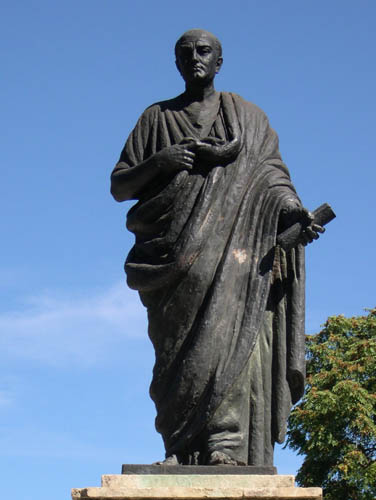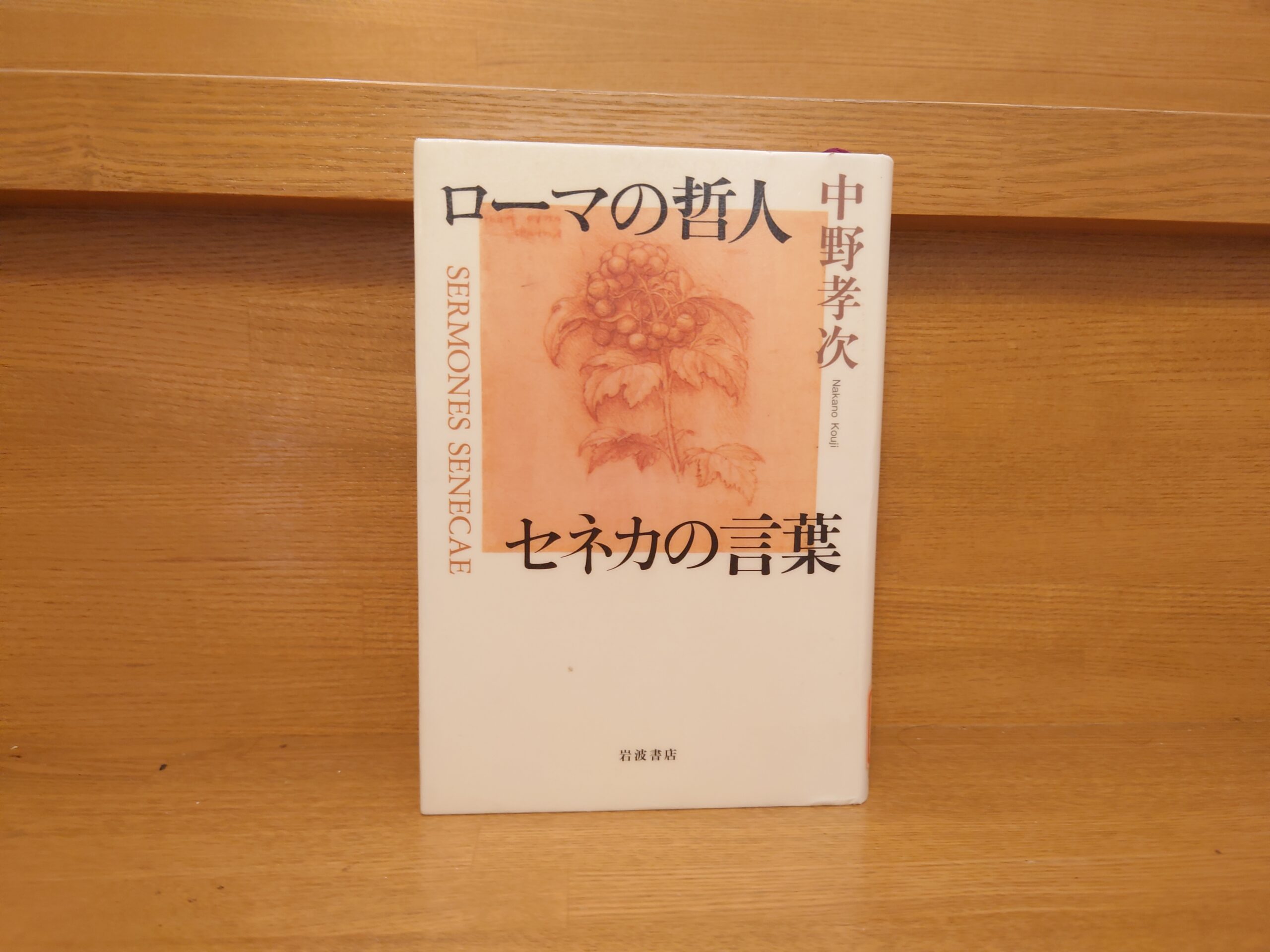Summary and Comments on Koji Nakano's "The Words of Seneca, the Roman Philosopher" - The Stoic philosopher who was a teacher of the tyrant Nero and later forced to commit suicide.
Introduced here is "The Words of Seneca, the Roman Philosopher," written by Koji Nakano and published by Iwanami Shoten in 2003.
Let's take a quick look at the book.
Two thousand years ago, there was such a vibrant thinker!
Seneca addresses themes that confront everyone at least once in his or her life, such as life, poverty, and death, and teaches the reader to truly live freely. Seneca's writings are incomparably appealing and strongly encourage those who are troubled. Koji Nakano has written a comprehensive introduction to Seneca's world, which until now has been little known in Japan.
AmazonProducts Page.

Seneca, the Stoic philosopher we are presenting here, is an earlier article in the periodA. Everitt, "Cicero: Another History of Rome," a highly recommended biography of the ancient Roman philosopher Cicero!But he is just about 100 years after the philosopher Cicero, whom we also introduced.
Seneca was a leading philosopher of the Roman Empire, who had the amazing distinction of being a teacher of that tyrant Nero.
Surprisingly, the tyrant Nero also ruled the Roman Empire as a good monarch for the first five years after becoming emperor. It is said that Seneca's education was behind this good rule.
However, it was not until Nero's murder of his own mother that his very face as a tyrant came to the fore. From that point on, Seneca began to distance himself from Nero. Finally, Seneca was forced to commit suicide by Nero, a tragic end.
This book, "The Words of Seneca, Philosopher of Rome," is an excellent introduction to Seneca.
The author describes the book in the "Foreword" as follows: "This book is a bit long, but it will give you a feel for the atmosphere of the book. The book is a bit long, but you can get a feel for the atmosphere of the book, so I will read it carefully.
I decided to introduce Seneca's words to Japan today because, more than anything else, I am fascinated by Seneca's writing. Ever since I started reading Seneca, I have been completely fascinated by his writings, and I have wondered why I had never heard of such interesting things before. I was surprised to learn that 2,000 years ago there was a thinker and literary figure who thought so vividly and expressed it in such wonderful language, and I felt that his thoughts and writings were meant for the Japanese people of today. I am sure that the reader will feel the same way after reading Seneca's words, which I will introduce below.
Seneca is a philosopher who is generally little known in Japan. This is due to the fact that since the Meiji Era, Japanese thought circles have regarded philosophy only in terms of the ancient Greek philosophy of Plato and Aristotle or the modern German idealism of Kant and Hegel, while the Stoic philosophy of Seneca and Epictetus of the imperial Roman era was regarded as nothing more than a philosophy of life, insignificant compared to the metaphysics of these philosophers. In short, Seneca's philosophy is "the theory of theology. In short, Seneca was regarded as an antiquated moral theory like the "Analects" and not worthy of being taken up by modern philosophy. I, too, foolishly, had been infected with such an atmosphere without knowing the real thing.
One day, however, I read three articles in "On the Shortness of Life" in the Iwanami Collection (in addition to the title, "On Peace of Mind" and "On the Happy Life") and was immediately drawn in by the power of the writing and Seneca's thoughts on life as described in the articles. It is indeed powerful, lively, and persuasive. I found myself nodding my head in agreement. Seneca was first and foremost a literary figure to me, and I was fascinated by the power of his writing. (I was fascinated by the power of his writing.)
I am not attracted to the ancient Greek philosophy of Plato and Aristotle or the modern German idealism, but I felt the wisdom of Seneca's philosophy of life.
All of Seneca's writings are written in the style of letters to someone specific. From his first article, "Consolation to Malchia," in which he consoles a mother who is still recovering from the grief of losing her child, to his last "Letters on Morals," in which he addresses 124 letters to Lucilius, all of them are written in a style that makes the reader feel as if he or she is being spoken to by Seneca, and is persuaded.
Moreover, all of the topics he discusses are very specific, such as death, poverty, wealth, pleasure, nature, happiness, destiny, friendship, life insecurity, and freedom, all of which are issues that are sure to arise in anyone's life. The charm and power of his writing is unparalleled, as he takes such everyday topics and powerfully invites us to the ideal way of life and virtue. I thought that the source of the philosophy of life and literature, which later led to Montaigne and Alain, could be found here. Both of them seek and preach "the art of becoming human," rather than developing a philosophical system.
I had promised Akio Yamaguchi of Iwanami Shoten for some time to write a book of sorts, an anthology of words I have encountered in my life. Since the fall of 2008, however, I have been trying to write a book, but it has not been going well. I realized that the story of my life experiences and the search for the meaning of words are two different tasks, as if water and oil were mixed together, and that the nature of the two tasks makes them impossible.
After trying many other things, none of which worked, I decided that it would be a good idea to compose a word book on Seneca, which is my current passion, and introduce it to the world. Since this is my focused interest, there are plenty of things to write about. Alan once said that the only correct way to understand an author is to read him for the very sustenance he needs at the moment, and that is exactly what I did. So, although this is my own personal Seneca, I believe that Seneca's words here will be an encouragement, a cajoling, and a life-enhancing aid to those who live in today's hard-living Japan.
I presented the idea to Mr. Yamaguchi again, and he was very much in favor of it. This is both a summary of Seneca and an introduction to his words. I would be more than happy if, as I hope, this will serve as good advice for Japanese people living today.
Iwanami Shoten, Koji Nakano, The Words of Seneca, the Roman Philosopher, p. ⅴ-ⅸ.
Some line breaks have been made.
How about it, you may be somewhat interested in the person of Seneca. Moreover, as you will see in the book, Seneca was a man of ideas that had something in common with "The Analects" and Buddhism. This was very interesting to me as a Buddhist monk.
This work is highly recommended as an introduction to Seneca, the great Roman philosopher and forefather of life.
In the first half of the book, Seneca's life is briefly discussed, giving us an idea of the kind of life he lived.
We will then read together the famous phrases selected by the author from Seneca's works.
The author seems to have quite a lot on his mind about modern Japan, and along with Seneca's words, he harshly criticizes the state of modern man.
I can seriously feel that they are worried about what will happen to the book in the future.
Although it seems that such discourse has become much less common these days, I believe that it is important to question our modern way of life based on the words of the ancient greats.
Whether one agrees with Seneca or the author's assertions is up to the individual, but to face the words head-on. That in itself can be a very important reading experience.
I would highly recommend this book as well.
The above is "Koji Nakano's "The Words of Seneca, the Roman Philosopher" - Recommended for an introduction to Seneca! The Stoic philosopher who was a teacher of the tyrant Nero and later forced to commit suicide was".
Next Article.
Click here to read the previous article.
Related Articles







































